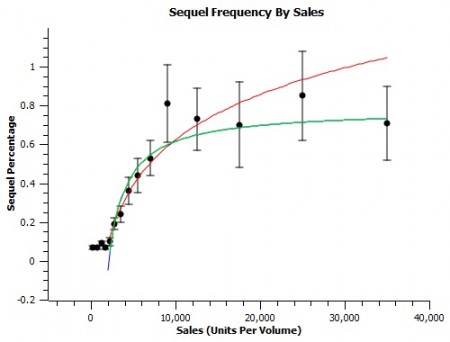Ask John: What Ensures that an Anime Gets a Sequel?

Question:
What are some of the things that can guarantee an anime series a sequel? For a while I thought that if a show was popular enough and sold well, then a sequel would be inevitable. However, it seems that a lot of the less popular titles such as Kill Me Baby, GJ-Bu and Tamako Market are getting some green-lit sequels despite the lack of popularity of their first seasons. Are the success of some shows essential for a series to get a sequel, or is there more to it than that?
Answer:
As just about any and every anime fan realizes, predicting sequels is never a reliable act because so many different factors influence the possibility of sequel productions. Of course, popular success is the hallmark of subsequent productions, but not even tremendous success is always a certain guarantee. Since anime productions are primarily made either to generate revenue or to boost interest in originating source material – in other words, many anime are produced, practically, as extended commercials for the novels, manga, or games that they’re adapted from – shows that do generate profit tend to get continued so that they can continue generating more profit. For example, the absence of any new Suzumiya Haruhi anime over the past three years may be attributable to a number of circumstances, but one of the biggest contributing factors is the fact that author Nagaru Tanigawa hasn’t composed a new novel in the past three years. With no new books to promote, Kadokawa hasn’t invested any additional funds toward creating promotional anime. Another example of popularity not resulting in a sequel is the 2001 Fruits Basket television series. Despite proving popular in Japan, despite the existence of plenty of additional manga to adapt, and despite even a FUNimation sponsored American promotional campaign to plead for a sequel production, no Fruits Basket anime sequel was ever produced. Even intent from the Japanese staff doesn’t always guarantee sequels. In August 2005 Nadesico & Uchuu no Stellvia director Tatsuo Sato stated publicly that he was unable to proceed with additional Nadesico or Stellvia anime productions. Sato never explained why.
However, oddly, sometimes titles that don’t seem especially successful or likely to receive sequels do, in fact, get subsequent productions. Right now, in fact, the Freezing Vibration television series is airing two years after its moderately successful premiere series. The first season of last year’s Senki Zessho Symphogear was not a big hit, yet it still got a sequel series this year. Considerations including the narrative potential of a sequel series to continue to draw audiences or capitalize upon the foundation of the original series must be taken into account. For example, series such as Symphogear and Queen’s Blade seem to have gotten better and become more popular in subsequent series. Cult appeal also goes a long way. Series such as Hakuouki, Hiiro no Kakera, and Uta no Prince-sama don’t have a tremendous amount of mainstream following but do enjoy devoted cult support that justifies their continued production.
Typically, hobby anime are practically always guaranteed subsequent series. With titles including Pokemon, Yu-Gi-Oh, Duel Master, Cardfight Vanguard, Battle Spirits, Beast Saga, Tanken Drilland, Inazuma Eleven, and this season’s Gaist Crusher, so long as the games and toys remain in production, the anime will likewise remain in production. Multimedia franchises like .hack and Love Live will certainly get multiple series based on, if nothing else, the sheer determination of the production sponsors to manufacture hit franchises. And hit shounen and shoujo titles like Naruto, Fairy Tail, Soul Eater, and Pretty Cure can be depended upon to get subsequent series. However, outside of those particular fields, sequels are never a certainty. Even very popular titles like Cowboy Bebop and High School of the Dead have not received second series.
Fan site Animetics recently posted a mathematical analysis of the probability of any given anime title getting a sequel. While a lot of math and probability is involved, even Animetics recognizes that a number of additional variables can still influence probability one way or the other.
Add a Comment
You must be logged in to post a comment.


There’s also the “five year” rule. It’s nominally for children’s pop culture properties but also works for anime. It means that if a show is marketed to a specific age segment, in five years it would get a new audience and so demand would bounce up and there would be enough interest for new content.
I’m guessing an unpopular anime which gets a sequel probably does the job of filling up airtime during a crappy timeslot.
One thing I noticed from radio: programmers play favorites. Heck, wouldn’t you if you were in their position?